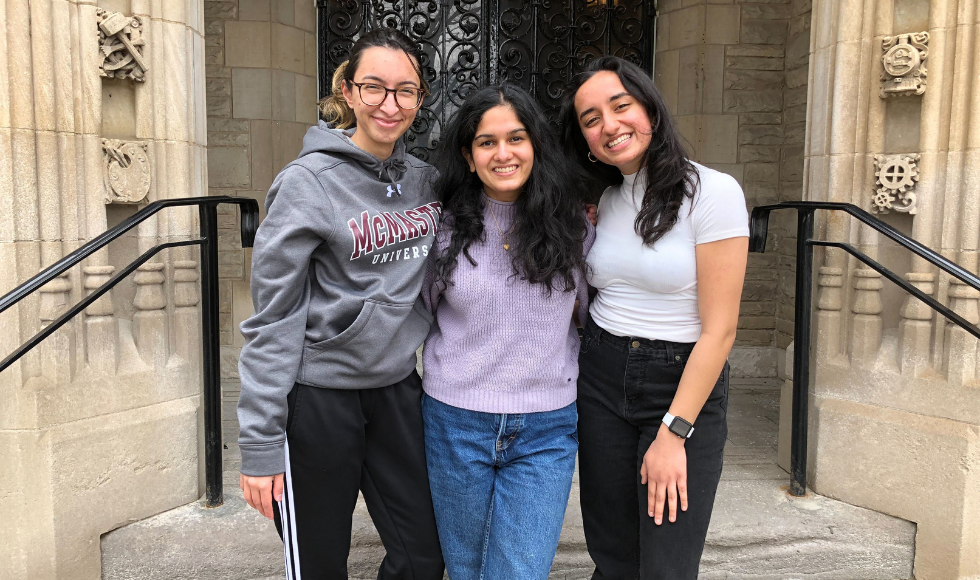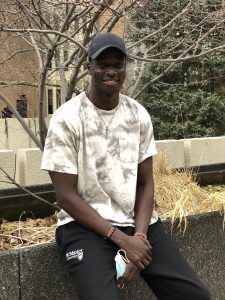How McMaster students are helping student refugees integrate into campus community

(From left to right) WUSC McMaster members Salma Abrahim (fourth-year Honours B.Sc. Kinesiology), third-year Bachelor of Life Sciences student Janvi Bedi and fourth-year Bachelor of Health Sciences student Sahrish Masood.
Biong Deng had been living as a refugee in Kenya for ten years when he found out he was going to be sponsored to come to Canada as a student refugee.
“When I heard that I was placed at McMaster I was really excited,” says Deng.
But the native of South Sudan was facing a lot of unknowns. He did not know anyone in Canada or anyone who had been to McMaster.
“It was just uncharted territory. For me, I didn’t know what to expect,” says Biong.

While he waited to start university in Canada, a handful of McMaster students were getting ready for his arrival, buying essential items like electronics, bedding and winter clothing for him.
“You’re setting up someone’s brand new life here, having to start from the ground up,” says Sahrish Masood, who is one of those students and serves as co-president of the McMaster chapter of World University Service of Canada (WUSC).
WUSC is a Canadian international development non-profit organization that works with post-secondary educational partners to help resettle displaced youth refugees. Their Student Refugee Program provides sponsorship and basic financial and social support.
The McMaster chapter of WUSC is made up of a group of ten students who welcome two student refugees to Mac every year and help them adjust to university life. They also hold fundraisers and awareness events to support education projects in Canada and abroad.
Their efforts are partially funded through the McMaster Student Union (MSU) which directs $1.68 of the annual operating fee collected from every full-time undergraduate students to the initiative.
Student refugees are also supported through a general bursary and McMaster covers their residence and meal plan costs for their first year of study.
WUSC McMaster is hosting a fundraiser selling boxes of Krispy Kreme Donuts. More information can be found on their Instagram page @wuscmcmaster.
Starting from the ground up
WUSC McMaster helps the incoming students with a range of supports, from setting up bank accounts, to navigating public transit and healthcare, to facilitating social connections throughout their time at McMaster.
“I think there’s a lot of advocacy in certain clubs. But I think what makes us different is we have that hands on experience,” says Salma Abrahim, who serves as WUSC McMaster co-president alongside Masood.
Deng says the student group has been a steady source of support for him since he arrived on campus last year.
“They’ve really, really helped me. They’ve exceeded my expectations,” says the Honours Bachelor of Arts in Health and Society student.
Masood and Abrahim say the student group has strongly benefitted from the fact that a student that came to Mac through the program is now a member of WUSC McMaster and is using their lived experience to help other newcomers.
“Having that emotional support from someone who’s been through that process and now is doing very well on her own just kind of gives them that hope,” says Masood.
Helping students and scholars at risk
Janvi Bedi, WUSC McMaster’s director of events, has been working with McMaster’s Committee on Students and Scholars in Crisis (CSSC) to explore how the student group can support Mac’s efforts to help students and scholars at risk around the world.
McMaster has pledged to support a third WUSC student for 2022 from Afghanistan and Bedi says the group is hopeful they can offer support to that student as well.
“At the end of the day, all of our goals are the same,” says Bedi. “Just to make a difference and get as many people as we can to come here.”
View Donation Page: McMaster program to support forcibly displaced students and scholars
The relationships between the incoming students and WUSC McMaster members has become a reciprocal one, say Masood, Abriham and Bedi.
“They definitely teach us,” says Abrahim.
“It is life changing in a way because you forget that we are advocating for the cause but we are also advocating for the individuals that are being impacted,” says Masood. “We get to see them thrive under a new environment so it’s really great.”
Deng says it has been an exciting year of transition for him, and while the first-year student is still unsure exactly where his studies will take him, he counts himself lucky.
“This is one of the best schools and for WUSC to put me into this school, it’s going to have a lasting effect on me and it’s going to shape me towards something greater.”


